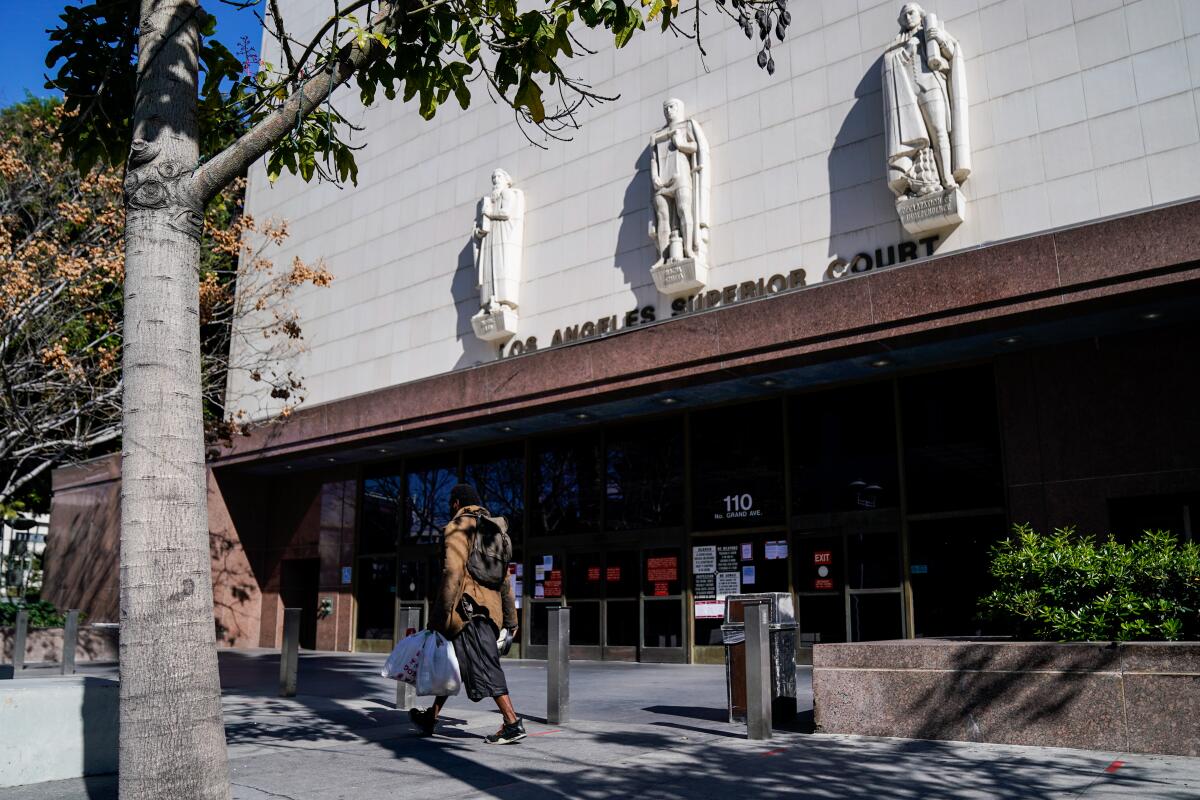Op-Ed: The mentally ill defendants in my courtroom need treatment, not jail

This month, the Los Angeles County Board of Supervisors and chief executive are putting together the county budget and deciding how to spend around $36 billion of our taxpayer dollars. They have committed to a âcare first, jails lastâ vision of public safety that centers community-based health solutions and services â particularly for people with mental illnesses.
I strongly support this commitment because easily one-third of all criminal defendants who come through my courtroom and other courtrooms across the county â thousands of people a year â are identified by defense counsel and assessed by Department of Mental Health personnel as having a mental illness. Prolonged incarceration for people with mental illnesses worsens outcomes and, yes, is more costly and less effective than community treatment.
Yet the county has grossly underfunded the critical community treatment options that judges, prosecutors and defense attorneys want to use and which we know work.
To make the âcare first, jails lastâ vision a reality, the county must invest much more in the professionals who conduct mental health evaluations in the courts, the people who connect defendants to services, and the programs that are alternatives to incarceration for people with mental illnesses.
First, the county is not funding enough forensic professionals â social workers, psychologists and psychiatrists â to identify people who qualify for âmental health diversion,â a process under state law that allows judges to help defendants with mental illness engage in treatment instead of ending up incarcerated with a criminal conviction. The current corps of forensic professionals are overworked and there are often long waiting periods for assessments. Increasing the number of these professionals will cut down on delays for people who clearly belong in treatment settings.
Second, there need to be many more trained staff working in the courts to connect defendants who have unmet treatment needs to mental health programs in the community. The countyâs Department of Mental Healthâs Court Linkage Program does this, and the staff recommendations often help judges choose treatment as the appropriate approach to a case. However, the program is currently facing a staff shortage due to underfunding, especially in the largest criminal courthouse in downtown Los Angeles. Without more staff to connect defendants to services and follow-up support, it wonât be possible to achieve the âcare firstâ vision.
Third, and perhaps most important, the county needs to fund places for people with mental illness to land â programs that provide treatment in the community and housing for those who need it. The countyâs Office of Diversion and Reentry housing program is a valuable option for the many defendants who are homeless and have a mental illness. The program is well-respected in the courts because it is effective in providing case management and supportive housing, which address some of the root causes of harm in our communities.
A recent research study by the Rand Corp. found that many more people in the county court system should be given access to this program. But judges cannot place people in ODR housing because the county has not funded it adequately. The county needs to invest in ODR immediately and without pause, so the program can take on more clients. No one who needs this care should be denied simply because of funding. In fact, the county should heed the advice of its own work group, which recommended an investment of $237 million to add 3,600 community-based treatment beds.
Many judges, like me, want to place people in treatment settings rather than jail. But we feel that our hands are tied without the countyâs political and financial commitment. I have long stood against jail expansion as a way to deal with people with mental illnesses in the criminal justice system. Thankfully, the county Board of Supervisors has decided against jail expansion, and there has been unmistakable progress toward getting people with mental illness out of the jails in recent years. But it should not be many years more before the critical next steps are taken.
It is imperative that the county expands alternatives to incarceration that connect people with mental illnesses to community-based treatment and provides critical supports, such as permanent supportive housing.
The current budget process will show whether the county is truly committed to the âcare firstâ vision by investing the money needed to carry it out.
Terry Lee Smerling is a judge on the Los Angeles County Superior Court.
More to Read
A cure for the common opinion
Get thought-provoking perspectives with our weekly newsletter.
You may occasionally receive promotional content from the Los Angeles Times.










